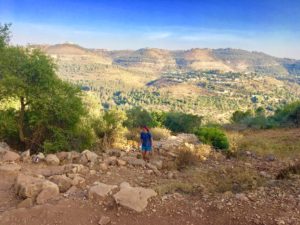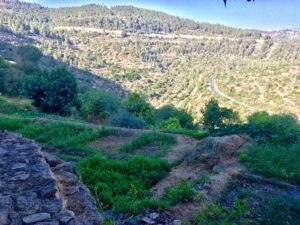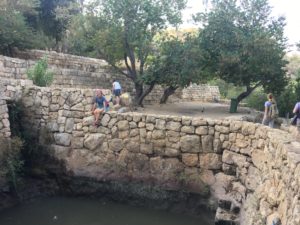
I want to share two volunteer experiences that I have had in my time here in Jerusalem this summer. The first was one which I had sought out; the second was rather unintentional (but I’ll get to that below). The Notre Dame Summer Language Abroad office encouraged us before we left to seek out safe and appropriate volunteering opportunities. We were not supposed to just waltz into a community and start ‘helping’ but instead we were to consult with locals concerning ways that we could be of service according to the local’s needs and desires.
I was unsure how to go about finding such opportunities, so with the encouragement of my mother, I contacted the Lutheran World Federation office to inquire about volunteering opportunities. The office welcomed my offer and offered me three jobs- picking up trash, painting the front gate, or removing rocks from the office’s olive tree groves. Given the summer heat, my husband encouraged me to practically choose the one which I could best accomplish–trash picking. So one morning at about 7 AM, I headed over to the offices, received my gloves and trash bags, and began a two hour scouring of the office parking lot and grounds.
Trash waste is a huge problem throughout most of Israel and the Palestinian territories. On the one hand, it is an issue of cultural attitudes: properly disposing of trash–let alone recycling items–is not something which is socially prioritized and embedded into the majority of the populace. On the other hand, it is an issue of infrastructure: trash services–let alone recycling services–do not function as effectively as in the United States. It is a matter of adequate funding and resources, especially in East Jerusalem and the West Bank. As I picked up broken bottles and wrappers, while trying to avoid the sharp bramble weeds, it was not difficult for me to ascertain that the LWF grounds would inevitably get trashed again by drivers casually disposing of waste on their rides to and from work, even by the end of the week.
It was not a glamorous job and it was not a job that offered me much opportunity to interact and connect with locals, as I had hoped volunteering would. However, when I turned in my full bag and gloves, the hearty thanks I received from the janitor staffed at the offices was well worth my efforts. He criticized local cultural attitudes for the mindless disposal of waste anywhere and everywhere. He explained that he had picked up 9 bags of trash just in the last week (a comment that made me feel sheepish for having filled only one bag), and that he thought it was a matter of respect for one’s peers and physical spaces that was still lacking in society. He then went on to talk about his children, including his son and his son’s new wife who have moved to the United States. As an Arab Christian, he was glad that they were able to get out and find better socioeconomic opportunities than he feels are available to Arabs in Israeli society today. It was only a short talk, but it gave me a small insight into the life experiences, working conditions, and dreams of one local man.

My second ‘unexpected’ volunteering experience came later in the summer when I signed up for a class trip on Israeli farming which I assumed would include visiting a farm and learning about farming techniques. I was surprised then when we arrived in a valley, about 30 minutes outside of Jerusalem, surrounded by hills and mountain ranges. Where were the fields of wheat or soy beans? Or the cows grazing in pastures? (Or the farm houses for that matter?) This was not just my MidWestern bias; I had in fact seen some ‘traditional’ farm fields up in the Galilee region earlier in the summer. What exactly, in these rocky hills, were the crop?
The crop was olive trees, some hundreds of years old and some only decades old. These hillsides belonged to the Jewish National Fund, which was founded in 1901 to buy and develop land for Jewish settlement, starting under the Ottoman control of the region of Palestine and then under the British Mandate of Palestine after the First World War. By 2007, it now owns roughly 13% of the land in Israel. We were not visiting a private farmer but one of twelve farm land areas now protected by the Israeli Zionist organization, Hashomer Hachadash, an organization which tries to support Israeli farmers and thousands of acres of farm land from abandonment as fewer and fewer Israelis have the means to continue farming, both because it has lost popularity since there are other more lucrative industries to work in and also because of the difficulty of protecting the land amidst the conflict.
When I asked how the JNF had acquired the land we were walking through, the tour leader admitted that these lands had belonged to Arab families who “were forced to leave them” during the 1948 war. The phrase made me pause: “were forced” was a phrase in the passive tense. It masked who or what was responsible for “forcing” these Arabs to “leave”. The tour leader then pulled out rakes, hoes, and cutting sheers and announced that we would be cleaning up the grounds around a patch of olive trees.

In order to harvest olives, it is first necessary to clear all of the shrubs and weeds around the tree, which compete with the tree for scarce water. It is also important to remove the lowest branches of the olive tree so that the tree devotes all of its energy toward the upper branches for growing olives. When the olives are ready to be harvested, tarps are laid down around the tree so the olives can be dropped onto the tarps. Thus you also need to remove large stones so that the tarp can lay as smoothly as possible. The olives are then pickled or pressed into olive oil. This work is all done voluntarily, so if some trees do not get cleaned up, it is difficult or impossible to pick the olives from that tree for the current season. The tour guide explained that all of the proceeds go to diverse local charities.
With a pair of sheers in my gloved hands, I set to work trimming lower branches and weeds surrounding a nearby tree. After about two hours, our small group had cleared three trees. When we finished the guide said, “Now that you have contributed your sweat and efforts, this land belongs to you too. We want this land to belong to everyone.” As I had worked, I had wondered who had planted this tree and what their hopes were for it. The tree I trimmed was not too old–only 100-125 years more or less. This meant that it had most likely been planted by the Arab families who lived here and worked this land at that time who have since 1948 not been able to return here. ‘Belonging’ is a highly contested notion here amidst the conflict. I am unsure what the circumstances were which forced those families to leave, but it is clear that, at this point in time, this piece of land I visited does not “belong to everyone”.